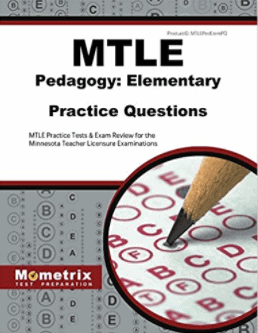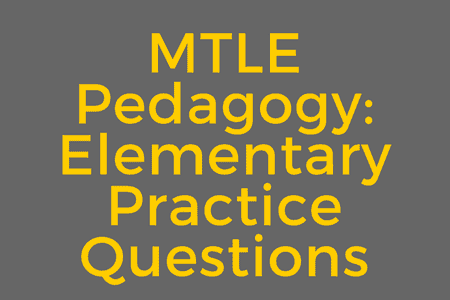Becoming a teacher in Minnesota means that you will be required to pass specific exams for a particular license. The MTLE exam is a recognized exam that is used to grant an initial teaching license in the state of Minnesota. There are several MTLE exams that can be taken. The MTLE exams include basic skills assessment, birth through secondary pedagogy tests, and content area tests for grades kindergarten through twelve. Content-area tests are exams pertaining to main subjects, such as business, chemistry, life science, health, math, language, reading, social studies, music, technology, etc.

The MTLE Pedagogy Elementary exam is a computer-based exam that includes 2 subtests. Both subtests include 50 questions and both are timed for up to 1 hour to be completed.
The first subtest of the MTLE Pedagogy Elementary exam consists of:
- Student Development and Learning
- Understand development during the elementary years and how to provide learning opportunities that support students’ physical, social, emotional, moral, and cognitive development.
- Understand learning processes and how to provide instructional opportunities that promote student learning and achievement.
- Understand student diversity and how to provide instructional opportunities that meet the needs of students with diverse backgrounds and exceptionalities and promote all students’ learning and achievement.
- Learning Environment
- Understand how to establish a safe, inclusive, and positive learning environment that encourages positive social interaction, active engagement in learning, and self-motivation.
- Understand how to create an organized and productive learning environment that promotes all students’ participation and learning.
- Understand how to use effective verbal, nonverbal, and media communication techniques to promote active inquiry, learning, collaboration, and supportive interaction in the classroom.
The second subtest consists of:
- Instruction and Assessment
- Understand various types of assessment; relationships among assessment, instruction, and learning; and the use of assessment to ensure students’ continuous development and achievement of defined standards and goals.
- Understand instructional planning procedures and how to use effective planning to design instruction that promotes learning and achievement for all students.
- Understand how to use a variety of instructional strategies to provide effective and appropriate learning experiences that promote all students’ achievement and foster development of critical-thinking, problem-solving, and performance skills.
- Professional Roles and Responsibilities
- Understand how to communicate and interact effectively with families, colleagues, and the community to support and enhance student learning and well-being.
- Understand professional development opportunities and resources and how to be a reflective practitioner who continually evaluates the effects of choices and actions on others, including students, parents/guardians, and colleagues, and who actively seeks out opportunities for professional growth.
- Understand the historical and philosophical foundations of education; the rights and responsibilities of students, parents/guardians, and educators in various educational contexts; and legal and ethical guidelines for educators in Minnesota.
MTLE Pedagogy: Elementary Practice Test Questions
1.Jean Piaget described which of his cognitive developmental stages as including characteristics of egocentrism, intuitive thinking, centration, animism, and magical thinking?
a. Concrete Operations
b. Formal Operations
c. Preoperational
d. Sensorimotor
2. Of the following descriptions, which one is an example of how social learning theory explains human development?
a. A child falls, is not hurt, and looks around at adults to determine whether or not to cry.
b. A child falls, is hurt, cries, gets attention from adults; falling again, is not hurt, but cries.
c. A child falls, is hurt, cries, is ignored by adults; falling again, is not hurt and does not cry.
d. A child falls, is hurt, cries, is yelled at by adults; falls and is hurt again, but does not cry.
3. Which of these combinations is most likely to cause frustration in children?
a. Physical development that exceeds cognitive development
b. Cognitive development that exceeds physical development
c. Social development that is exceeding linguistic development
d. Emotional development that exceeds linguistic development
Answers
- C: Piaget’s Preoperational stage occurs during early childhood and includes the characteristics named in the question. Concrete Operations (a) is the stage Piaget associated with elementary school ages. Formal Operations (b) is the stage Piaget said developed during preadolescence and/or adolescence, enabling abstract thought, perspective-taking, logical thinking, and decentration. Piaget’s Sensorimotor (d) stage is what he termed the period when infants learn through responding to sensory input with motor activities.
2. A: In his social learning theory, Albert Bandura demonstrated observational learning: unlike behaviorism, which stipulated people must be directly involved to learn new behaviors, Bandura proved children could observe others’ behaviors and their rewards, and then imitate those behaviors while seeking those rewards. Choice (b) describes positive reinforcement: after attention upon crying from a painful fall, the child repeats the behavior after a painless fall, seeking the same attention. Choice (c) describes extinction: with no response, crying is not reinforced but extinguished. Choice (d) describes punishment: although falling was painful both times, initially being scolded for crying inhibits the child’s crying again. These are examples of how behaviorism explains human development.
3. B: When development is more advanced cognitively than physically, a child is likely frustrated by thinking of many things s/he cannot do. With the reverse (a), the child can cause unintentional harm to things, pets, and younger children. Children whose social development exceeds their linguistic development (c) are less likely to become frustrated than to use nonverbal communication to support their superior social skills. Similarly, children with high EQs/emotional development beyond their language development (d) are less likely to become frustrated than to use their EQs and nonverbal communication skills instead of linguistic skills to interact socially.


Thank you . I am learning from mometrix.com. I am grateful.